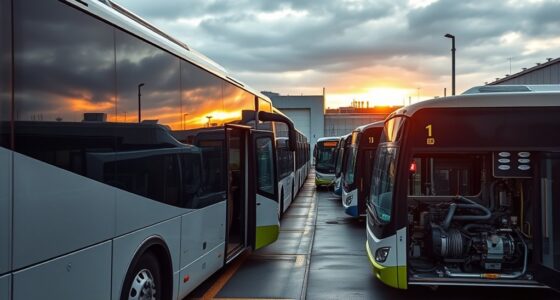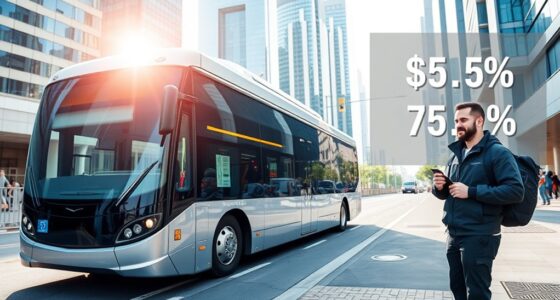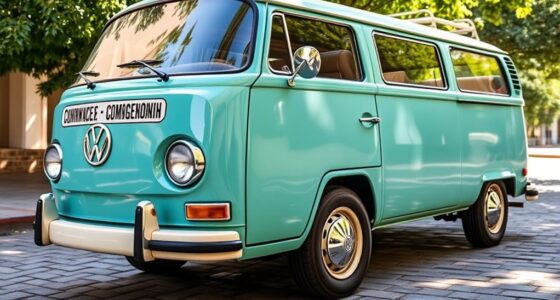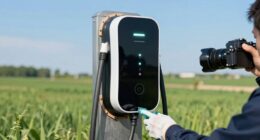Converting your VW Bus to electric can be worthwhile if you’re passionate about preserving its vintage charm while enjoying modern efficiency and sustainability. The process involves significant restoration, custom fabrication, and costs, so weighing effort against long-term benefits is key. It enhances safety, convenience, and eco-friendliness, but might diminish some original features. If you want a blend of nostalgia and innovation, this upgrade could be a smart move—plus, you’ll discover more insights if you explore further.
Key Takeaways
- Electric conversions boost sustainability and efficiency, reducing ongoing fuel and maintenance costs over time.
- Restoring the vintage look alongside modern electric components demands significant effort, expertise, and potentially higher costs.
- Preserving classic features enhances nostalgic value, but custom fabrication and parts sourcing can increase project expenses.
- The complexity of integration may extend timelines and require specialized tools, impacting overall project feasibility.
- The decision balances environmental benefits and modern safety against restoration challenges, costs, and maintaining vintage appeal.

Have you ever wondered how to transform a classic VW Bus into an eco-friendly electric vehicle? If so, you’re probably aware that this project isn’t just about swapping out an engine. It’s a complex process that involves tackling restoration challenges while preserving the vintage appeal that makes these buses so beloved. Restoring a vintage VW Bus for conversion means dealing with rust, worn-out parts, and outdated wiring, which can be time-consuming and costly. These restoration challenges require patience, expertise, and a clear plan to keep the bus’s iconic look intact. You’ll want to maintain the classic body lines, chrome accents, and original interior details to preserve that nostalgic charm. Achieving this balance between modernization and vintage appeal can be tricky but rewarding; it’s what makes the project worthwhile for many enthusiasts. Additionally, understanding the integration of modern electric components with vintage design elements is essential for a successful conversion. Converting the bus to electric isn’t just about aesthetics. It involves installing a new drivetrain, batteries, and necessary electrical components. This process demands technical skill and access to specialized tools, which can add to the project’s complexity. You’ll need to carefully contemplate where to place batteries for safety and balance without compromising the bus’s original style. Finding parts that fit seamlessly into the vintage design can be a challenge, especially since many components aren’t readily available. This often means custom fabrication or sourcing parts from specialized suppliers, which could bump up your costs and timeline. The vintage appeal is a significant reason why many choose to undertake this conversion. Your VW Bus isn’t just a vehicle; it’s a symbol of freedom, adventure, and a bygone era. Converting it into an electric vehicle can enhance its appeal by making it more sustainable and efficient for modern use. However, you must weigh whether the effort to preserve that vintage charm outweighs the benefits of a full modernization. Some purists argue that any alteration diminishes the original character, while others see it as a way to extend the bus’s life and relevance. Furthermore, advancements in on-device AI capabilities can improve the safety and navigation features of electric conversions, making your vintage VW Bus smarter and more connected. Ultimately, deciding whether converting your VW Bus to electric is worth it depends on your goals and resources. If you’re passionate about sustainability and vintage aesthetics, and you’re prepared to face restoration challenges, the project can be incredibly fulfilling. It’s a chance to breathe new life into a classic while making an environmentally friendly statement. But if you’re seeking a quick fix or a low-cost upgrade, it might be better to contemplate other options. Weigh your priorities carefully to determine if this transformation aligns with your vision for your beloved VW Bus.
Frequently Asked Questions
How Long Does an Electric VW Bus Conversion Typically Take?
Converting your VW bus to electric usually takes around 4 to 8 weeks, depending on your project timeline. Your skill requirements play a significant role; if you’re experienced with automotive work, you might finish faster. Otherwise, it can prolong the process. Factors like parts availability and complexity also impact the duration. Being organized and having a clear plan helps guarantee the project stays on track and within your expected timeframe.
Are There Any Government Incentives for Converting a VW Bus to Electric?
Imagine cruising in your vintage VW bus, now powered by clean electric energy. You might qualify for government grants and tax credits that can substantially offset conversion costs. These incentives aim to encourage eco-friendly upgrades, making your project more affordable. Check local programs, as eligibility varies. Taking advantage of these financial benefits can turn your nostalgic ride into an environmentally conscious adventure, saving you money while preserving your beloved bus.
What Is the Typical Lifespan of an Electric VW Bus Conversion?
Your electric VW bus conversion typically lasts around 10 to 15 years, depending on battery longevity and maintenance. You’ll find that batteries tend to lose some capacity over time, but proper care and regular maintenance can extend your vehicle’s life. Keep an eye on battery health and perform routine checks to guarantee peak performance. With good upkeep, your converted bus can serve you well for many years.
Can I Convert My VW Bus to Electric Myself or Need a Professional?
Converting your VW bus is like turning a classic ship into a sleek electric steamer—you can try it yourself or call in a pro. DIY feasibility depends on your skills, tools, and patience, but professional expertise guarantees safety and a smoother ride. If you’re confident with electrical work and mechanics, you might take on it yourself. Otherwise, hiring experts guarantees a reliable, efficient conversion without risking costly mistakes.
How Does an Electric Conversion Affect the Vintage Value of the VW Bus?
Converting your VW Bus to electric can impact its vintage appeal and collector value. You might lose some of the original charm that attracts enthusiasts, possibly lowering its desirability among collectors. However, if you keep original parts or restore it authentically later, you can preserve or even enhance its vintage appeal. Consider how the conversion aligns with your goals; it may boost daily usability without permanently sacrificing its collector value.
Conclusion
So, is converting your VW Bus to electric worth it? If you love the vintage charm but want modern efficiency, the benefits often outweigh the costs—saving on fuel, reducing emissions, and enjoying smoother rides. Some say the conversion process is too costly or complex, but with the right expertise, it’s a rewarding project. Ultimately, it’s a balance between your passion for classic style and your eco-friendly goals. Decide if the upgrade aligns with your journey.









